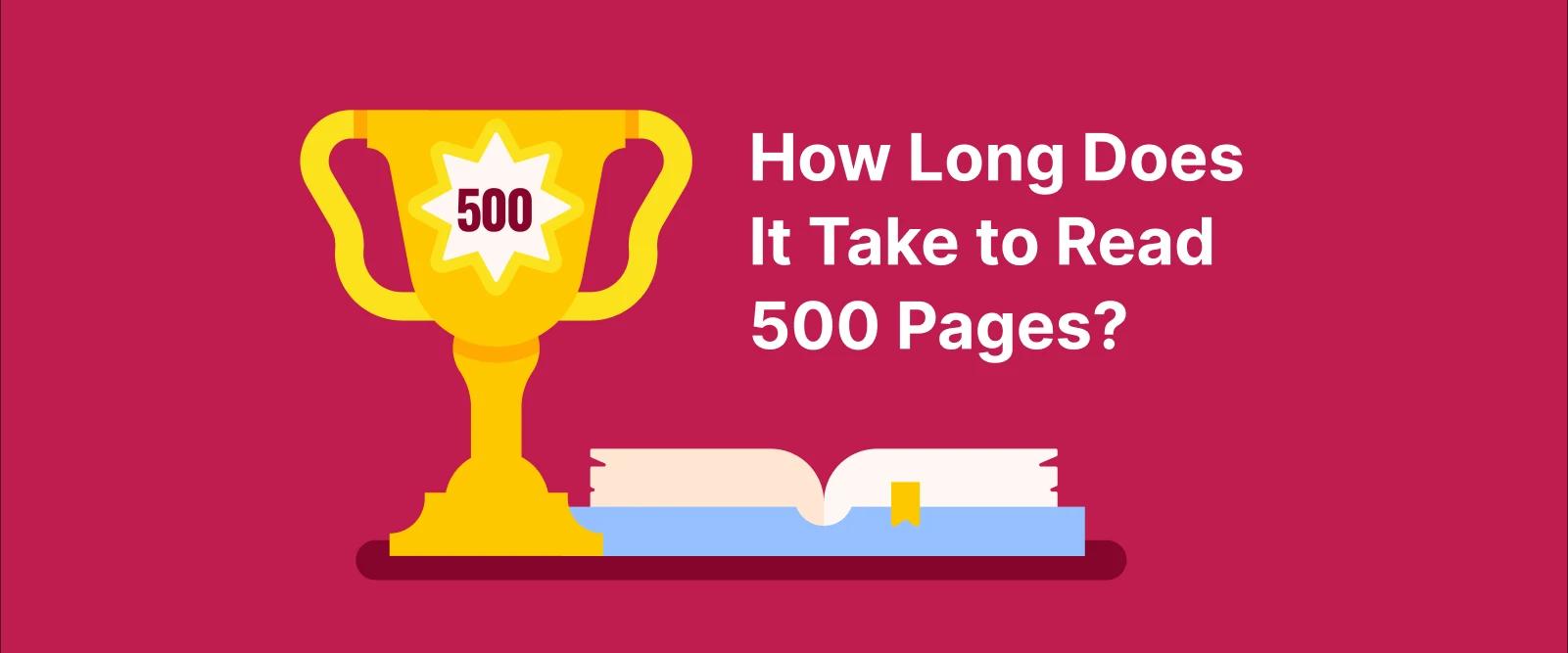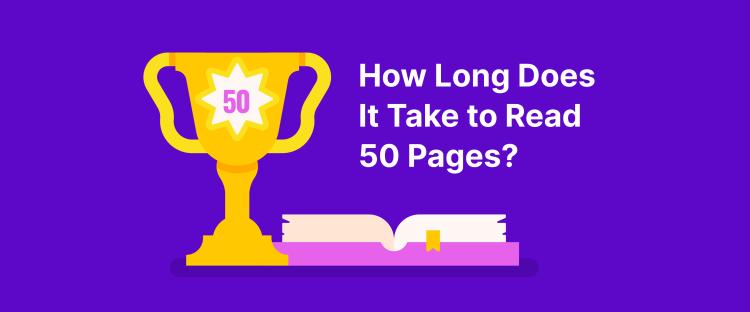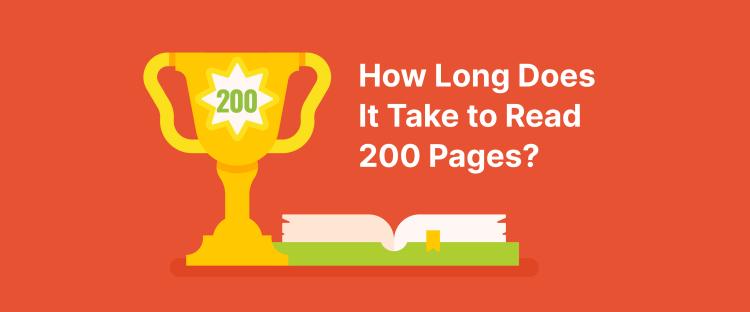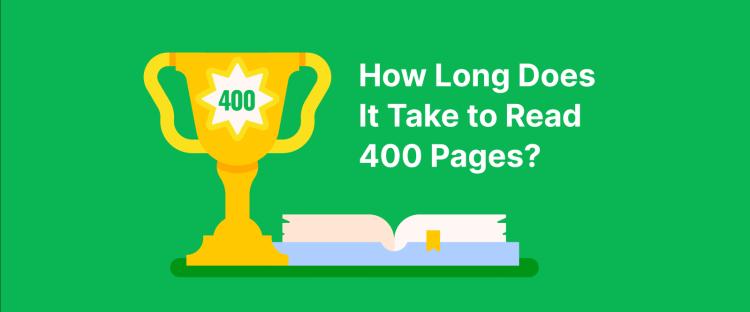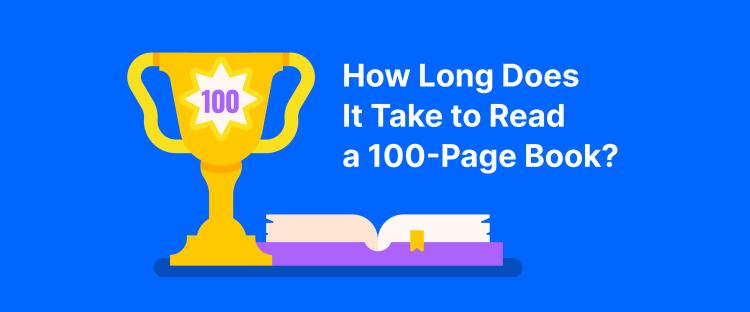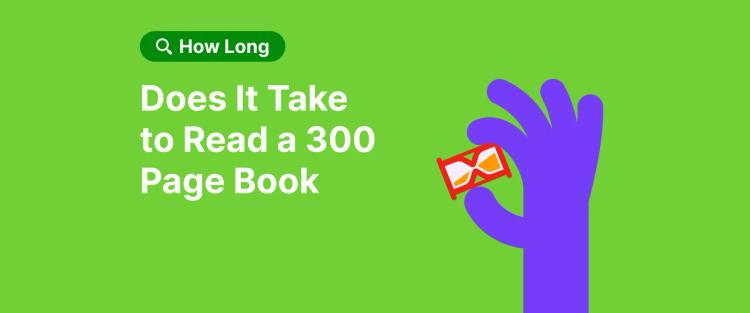So, how long does it take to read 500 pages? If you're an average reader, your reading speed is 200 words per minute (WPM), and finishing a 500-page novel will take 12.5 to 15 hours. However, a speed reader can finish a long book twice as fast.
In this article, you'll learn to calculate your average reading time and find helpful techniques like the Pomodoro Technique, note-taking, and mental rehearsal for getting through a good book in less time.
These reading retention and time-management strategies come from Headway's short book summaries of nonfiction bestsellers, such as 'Deep Work' by Cal Newport, 'The Power of Intention' by Dr. Wayne and W. Dyer, 'The Will to Change' by bell hooks, and 'Becoming Supernatural' by Dr. Joe Dispenza. Their bite-sized and learning-friendly format will help you get the most out of your daily reading habit.
Quick answer: How long it takes to read a 500-page book
Slow reader (150 WPM): It takes a slow reader approximately 16.5 to 18.5 hours to read a 500-page book.
Average reader (200 WPM): An average person can finish 500 pages in 12.5 to 15 hours.
Fast reader (500 WPM): A speed reader will take approximately 5 to 5.5 hours to read the same number of pages.
Follow along for practical tips on reading faster and retaining more from any book.
10 expert tips to increase your reading speed and retention
Have you ever felt stuck with a science-fiction novel or spent more than two hours on a nonfiction book and still remembered nothing? If so, you probably need to improve your focus and memory. With expert-backed self-growth and brain-training advice, reading books will bring you joy and practical value.
Using the Pomodoro Technique, mental rehearsal, emotional anchoring, and other techniques will help you speed up when reading a 200-page book or an Amazon Kindle novel and remember more.
1. Use the Pomodoro Technique
The Pomodoro Technique is a time-management method focused on working in short bursts, separated by short breaks. Try reading for 25 minutes, then take a 5-minute break. Having this brief, intense focus period prevents fatigue and keeps you mentally sharp to maximize retention.
Use this approach as your personal reading productivity hack, especially when tackling challenging material.
2. Challenge yourself with complex materials
Enhance your focus, retention, and overall cognitive growth by regularly challenging your mind with more complex materials. Challenging materials train your brain to process information more efficiently and boost long-term retention. This mindset is the key idea behind Cal Newport's 'Deep Work:'
"The key to becoming more valuable is cultivating the ability to work deeply."
3. Set clear goals before reading
When you set a clear, focused intention before your reading session, you signal to your mind that you're ready to engage with the material deeply. As Dr. Wayne and W. Dyer explain in 'The Power of Intention:'
"You get what you intend to create by being in harmony with the power of intention, which is responsible for all of creation."
So, before each reading session, write down what you hope to achieve. This clarity will help your brain focus and retain more efficiently when you're learning a new concept, getting inspired, or gaining a practical tool for your life.
4. Implement visualization techniques
Visualization can help you learn and remember information. Picture yourself fully understanding the material and easily applying it in real life. This mental exercise can make it easier for your brain to absorb and recall the information.

5. Analyze and reflect on content
After you finish reading, take a moment to reflect on what you've just learned. Think about the key points from each chapter and how they fit into your life. This simple step helps reinforce your understanding.
6. Engage with diverse perspectives
Reading books from different perspectives can improve your memory. The next time you pick a book, choose from other authors, genres, or cultures. This practice helps you remember better and deepens your understanding.
7. Take notes and review
Your active engagement with the text leads to deeper understanding. Taking notes during reading allows you to review and reinforce what you've learned. This approach reflects bell hooks' advice from 'The Will to Change:'
"Performance is different from simply being."
It means that pure observation isn't enough for your comprehension. So, when you read a book, write down key points or summaries in your own words. Revisiting your notes periodically will reinforce the material and improve retention. Headway book summaries are great tools for this purpose, as they collect all insights in one place, offering continuous access to your personal library.
8. Opt for the mental rehearsal method
Mental rehearsal helps your brain absorb information faster. Imagine yourself reading with ease and retaining information easily before starting a reading session. This technique trains your mind to absorb the content at a higher level.
9. Try focused meditation
Meditation improves cognitive abilities and helps prepare the brain for deep work. Practice a short meditation session before reading to clear your mind and sharpen your focus. According to Dr. Joe Dispenza's 'Becoming Supernatural:'
"Meditation opens the door between the conscious and subconscious minds."
This practice enhances both reading comprehension and retention.https://makeheadway.com/library/books/becoming-supernatural-summary/
10. Use emotional anchoring for better retention
Although logic is essential for learning, emotions also play a key role in memory retention. So, when taking a reading break, try to attach positive feelings to the material you're reading. For example, feel excited about the new knowledge you're gaining, which makes the information stick better.
What affects your reading speed and comprehension?
Your reading speed and comprehension depend on several factors, each affecting how effectively you absorb information. Understanding these elements can help you improve your reading efficiency and ability to retain the material.
1. Your reading skill level
Reading skill plays a big part in how quickly you process information. Advanced readers can swiftly spot patterns, pick out key themes, and guess what comes next, all of which boosts their reading speed.
2. Book complexity
The complexity of a book also matters. Books with tough vocabulary take longer to read and understand, especially if you're not familiar with the subject.
A simple, light novel like 'Harry Potter and the Philosopher's Stone' will typically be quicker to read than a dense academic textbook like 'The Origin of Species' by Charles Darwin.
3. Note-taking or skimming
When reading a nonfiction book for the first time, taking notes can help you understand it better. Skimming means quickly glancing through the text to get a general idea without focusing on every detail.
These two strategies can either speed up or slow down your reading, depending on the purpose and approach you take.
4. Reading purpose: Entertainment vs. study
The purpose of your reading affects how deeply you focus. If you're reading for fun, you usually read faster since you're just looking to enjoy the story.
However, reading to learn or study means you'll need to slow down, really think about the material, and keep the key points in mind. This helps improve your understanding and retention.
Your estimated reading time by speed: Fiction vs. nonfiction
As you already know, your reading time depends on many factors. Stephen King's horror novel, for instance, is the ultimate page-turner, while a nonfiction book on character development is a more thought-provoking reading recommendation.

We've picked two popular books, from both fiction and nonfiction categories, to show you how long it takes to read each one based on different reading speeds.
How long would it take to read 'The 48 Laws of Power' by Robert Greene?
The following chart provides a helpful way to estimate the time it will take to read Robert Greene's leadership guide, 'The 48 Laws of Power'. Whether you're a slow reader or fast reader, finishing this 480-page book can take anywhere from 4 to 13 hours.
| Reading Speed (WPM) | Words in 480 Pages | Estimated Reading Time (hrs) |
|---|---|---|
150 WPM (Slow) | 120,000 | 13.33 hrs |
200 WPM (Average) | 120,000 | 10 hrs |
250 WPM (Above Avg) | 120,000 | 8 hrs |
300 WPM (Fast) | 120,000 | 6.67 hrs |
500 WPM (Speed Reader) | 120,000 | 4 hrs |
How long would it take to read 'Angels and Demons' by Dan Brown?
Are you a devoted fan of professor Robert Langdon? Here's a detailed breakdown of an estimated reading time for Dan Brown's 496-page novel 'Angels and Demons.' Depending on your reading pace, you'll need between approximately 5 to 15 hours to get through the book.
| Reading Speed (WPM) | Words in 496 Pages | Estimated Reading Time (hrs) |
|---|---|---|
150 WPM (Slow) | 133,920 | 14.88 hrs |
200 WPM (Average) | 133,920 | 11.16 hrs |
250 WPM (Above Avg) | 133,920 | 8.93 hrs |
300 WPM (Fast) | 133,920 | 7.44 hrs |
500 WPM (Speed Reader) | 133,920 | 4.46 hrs |
These charts show the relationship between your reading speed and how long it will take to finish a long book. They'll help you add structure and clarity to your reading journey, all while tracking your progress over time.
Increase your average reading speed with Headway book summaries
Now that you know how long it takes to finish 500 pages, you can easily plan your reading time. With the right concentration and mindfulness-based techniques, finishing a 100-page book will be as easy as flipping through a bingeworthy sci-fi novel. Headway offers you a practical toolkit with useful memory retention and reading speed strategies from bestselling self-growth experts, psychologists, and life coaches.
So, next time you feel that taking on a 300-page book is too much for you, check out Kam Knight's 'Speed Reading: Learn to read a 200+ page book in 1 hour' and Benedict Carey's 'How We Learn' for more insightful tips on speed reading and better retention.
Download the Headway app today and transform your love for reading into a lifelong habit with top-rated nonfiction books!
Frequently Asked Questions
Can you read 500 pages in a day?
Yes, it's possible to read 500 pages in a day, but it depends on your reading speed and focus. For an average reader (200 words per minute), it would take about 12.5 to 15 hours to finish 500 pages.
If you're a speed reader (500 words per minute), you could cut that down to 5–6 hours. To make it manageable, you can break it into reading sessions (e.g., 2–3 hours at a time with breaks).
How to read a 500-page book in a week?
To read a 500-page book in a week, break it down into manageable daily goals. Aim for about 70–75 pages per day. Set aside time in your schedule, like 30 minutes to 1 hour, and commit to reading without distractions.
If you're using an app like Headway, you can read bite-sized summaries, which condense key insights, making it easier to absorb more information in less time. For example, reading 20 pages in the morning, 30 during lunch, and 20 before bed adds up to 70 pages, effortlessly reaching your weekly goal.
What is the difference between cramming and comprehension?
Cramming is short-term information absorption, while comprehension focuses on long-term retention and understanding of the material's significance.
For instance, cramming before a test might help you remember dates for a day, but comprehending historical events will enable you to grasp their relevance and impact.
How long should a 1000-page book take?
For a 1,000-page book, reading time varies with your speed. An average reader (200 words per minute) would take around 25–30 hours to read it, while a speed reader (500 words per minute) could finish it in 10–12 hours.
You can spread the reading across several days, like reading 50 pages a day for 20 days. To maximize retention, mix it up with breaks, note-taking, or summaries to reinforce key concepts. Using Headway's bite-sized summaries of long nonfiction books can help you absorb essential lessons faster.
How many pages to read in a year?
To read 50 books in a year, aim for about 10,000 pages, which translates to roughly 200 pages per week. If you're averaging 20 pages a day, you'd finish 7,300 pages in a year. Want to read more? Increase your daily pages to 30–40 for a goal of 15,000+ pages per year.
Setting a goal like "Read 30 minutes a day" can make this goal achievable while keeping it realistic. Tools like Headway's summaries can help fit more books into your schedule without sacrificing quality.
What is the 50-page rule?
The 50-page rule is a reading strategy that encourages giving a book at least 50 pages before deciding whether to continue or abandon it. This rule helps prevent you from prematurely dismissing a book that could become valuable.
If the first 50 pages don't captivate you, it's likely not the right fit, but if it's intriguing, it could be worth continuing. For example, you've picked up a self-help book, and after 30 pages, you're not entirely convinced whether to finish it or not. Follow the rule and push through to page 50. If you're still unsure, move on!

